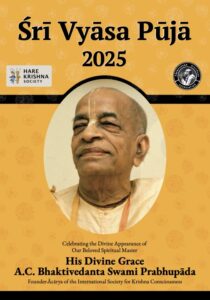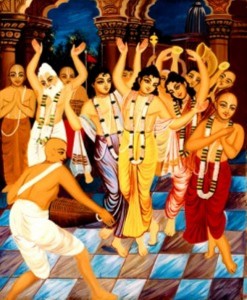Madhya 3.96–When the rice thrown by Nityānanda Prabhu touched His body, Advaita Ācārya thought Himself purified by the touch of remnants thrown by Paramahaṁsa Nityānanda. Therefore He began dancing
.PURPORT-The word avadhūta refers to one above all rules and regulations. Sometimes, not observing all the rules and regulations of a sannyāsī, Nityānanda Prabhu exhibited the behavior of a mad avadhūta. He threw the remnants of food on the ground, and some of these remnants touched the body of Advaita Ācārya. Advaita Ācārya accepted this happily because He presented Himself as a member of the community of smārta-brāhmaṇas. By touching the remnants of food thrown by Nityānanda Prabhu, Advaita Ācārya immediately felt Himself purified of all smārta contamination. The remnants of food left by a pure Vaiṣṇava are called mahā-mahā-prasāda. This is completely spiritual and is identified with Lord Viṣṇu. Such remnants are not ordinary. The spiritual master is to be considered on the stage of paramahaṁsa and beyond the jurisdiction of the varṇāśrama institution. The remnants of food left by the spiritual master and similar paramahaṁsas or pure Vaiṣṇavas are purifying. When an ordinary person touches such prasāda, his mind is purified, and his mind is raised to the status of a pure brāhmaṇa.The behavior and statements of Advaita Ācārya are meant for the understanding of ordinary people who are unaware of the strength of spiritual values, not knowing the potency of food left by the bona fide spiritual master and pure Vaiṣṇavas.
Madhya 3.98–“To make Me a madman like Yourself, You have thrown the remnants of Your food at Me. You did not even fear the fact that I am a brāhmaṇa.”
PURPORT-The words āpanāra sama indicate that Advaita Ācārya considered Himself to belong to the smārta-brāhmaṇas, and He considered Nityānanda Prabhu to be on the transcendental stage with pure Vaiṣṇavas. Lord Nityānanda gave Advaita Ācārya His remnants to situate Him on the same platform and make Him a pure unalloyed Vaiṣṇava or paramahaṁsa. Advaita Ācārya’s statement indicates that a paramahaṁsa Vaiṣṇava is transcendentally situated. A pure Vaiṣṇava is not subject to the rules and regulations of the smārta-brāhmaṇas. That was the reason for Advaita Ācārya’s stating, āpanāra sama more karibāra tare: “to raise Me to Your own standard.” A pure Vaiṣṇava, or a person on the paramahaṁsa stage, accepts the remnants of food (mahā-prasāda) as spiritual. He does not consider it to be material or sense gratificatory. He accepts mahā-prasāda not as ordinary dāl and rice but as spiritual substance. To say nothing of the remnants of food left by a pure Vaiṣṇava, prasāda is never polluted even if it is touched by the mouth of a caṇḍāla. Indeed, it retains its spiritual value. Therefore by eating or touching such mahā-prasāda, a brāhmaṇa is not degraded. There is no question of being polluted by touching the remnants of such food. Actually, by eating such mahā-prasāda, one is freed from all the contaminations of the material condition. That is the verdict of the śāstra.
Madhya 3.99—Nityānanda Prabhu replied, “These are the remnants of food left by Lord Kṛṣṇa. If You take them to be ordinary remnants, You have committed an offense.”
PURPORT-In the Bṛhad-viṣṇu Purāṇa it is stated that one who considers mahā-prasāda to be equal to ordinary rice and dāl certainly commits a great offense. Ordinary edibles are touchable and untouchable, but there are no such dualistic considerations where prasāda is concerned. prasāda is transcendental, and there are no transformations or contaminations, just as there are no contaminations or transformations in the body of Lord Viṣṇu Himself. Thus even if one is a brāhmaṇa he is certain to be attacked by leprosy and bereft of all family members if he makes such dualistic considerations. Such an offender goes to hell, never to return. This is the injunction of the Bṛhad-viṣṇu Purāṇa.
May 6 1973 LA lectureKṛṣṇa says in the Bhagavad-gītā: yo me bhaktyā prayacchati. Patraṁ puṣpaṁ phalaṁ toyaṁ yo me bhaktyā prayacchati [Bg. 9.26]. Kṛṣṇa says that “A little flower, little water, little fruit, that’s all, if somebody offers Me with devotion and love, then I eat.” Kṛṣṇa is not hungry. Kṛṣṇa is not hungry. He is self-satisfied, pūrṇa. But if His devotee offers Him something with love and affection, then He accepts. So do not think that “We have made such nice, sumptuous plate for Kṛṣṇa. Kṛṣṇa must eat.” No. There is no such thing, “must.” You cannot make Kṛṣṇa must. That is not possible. So Kṛṣṇa will see how much you have love for Him. Then He will accept. Otherwise He’ll reject. Therefore, it is forbidden, those who are nondevotee, those who are not initiated, those who are not chanting regularly,their offering to Kṛṣṇa will not be accepted. We must be very careful. We must know our position, whether I am sincerely following the principles of devotional service. Then Kṛṣṇa will accept. Yo me bhaktyā prayacchati. The real thing is bhakti. So either you offer Kṛṣṇa prayers or you offer foodstuff, everything must be along with bhakti, devotion, love. Then Kṛṣṇa will accept.
Some Conclusions—Prasadam or maha prasadam is always purifying even if touched by the mouth of a candala and cannot be contaminated.
On the other hand we must also consider what is and what is not considered Krsna Prasadam. Srila Prabhupada gives us both sides of this equation.
Hare Krsna
damaghosa das




